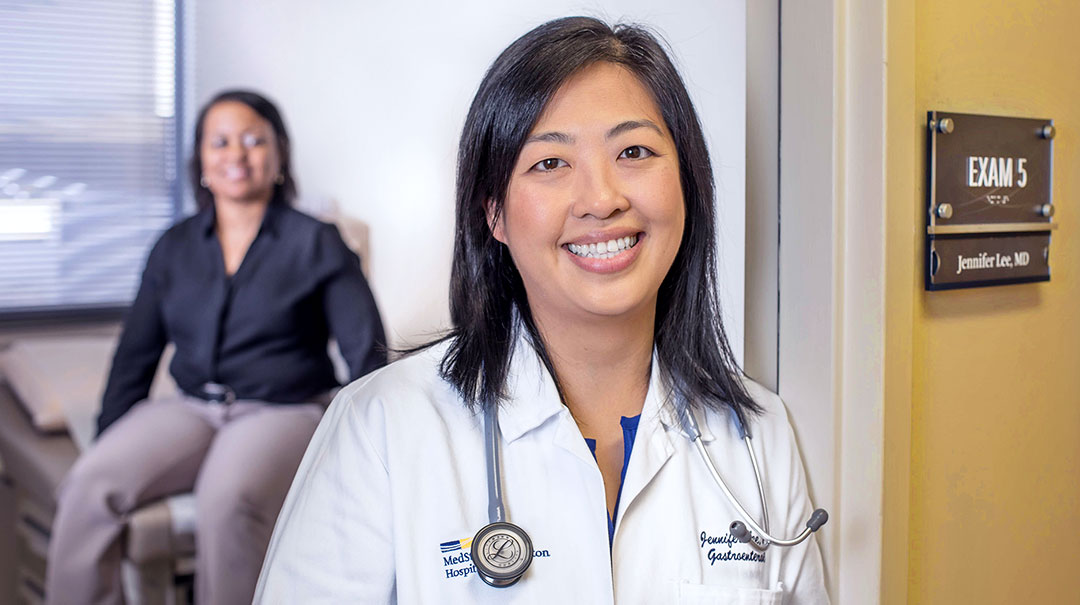Colorectal cancer is the second-leading cause of death among cancers that affect both men and women. However, it’s also one of the most preventable cancers thanks to advances in colonoscopy. Regular colonoscopy gives patients the chance to have potentially precancerous masses called polyps removed from the colon before they can turn into cancer.
A national campaign, 80% Pledge (also known as the 80% by 2018), was established to increase the colorectal cancer screening rate to at least 80 percent of eligible adults by the Dec. 31, 2018. Colonoscopy is the gold-standard of colon cancer prevention, and this goal is achievable if patients understand the importance of colonoscopy and providers do a better job of educating patients about screening.
My colleagues and I are passionate about preventing colon cancer. I jokingly refer to myself as a colonoscopy cheerleader: “Hooray! You got your colonoscopy!” However, not enough people who are eligible for colonoscopies get screened for a variety of reasons. In fact, one in three adults between 50 and 75 are not up-to-date with their screenings.
There are many reasons people avoid colonoscopy, but the fact remains: Colonoscopy saves lives, and no excuse for not getting one is worth the risk of developing potentially devastating—yet often preventable—colorectal cancer.
Why do so many people avoid screenings?
One of the most common reasons patients avoid colonoscopy is that they don’t want to receive bad news. This is understandable, but the majority of patients get positive news after a colonoscopy. Even if we find polyps, they often can be removed before they develop into cancer. According to data from the Centers for Disease Control and Prevention, colonoscopy prevented half of expected colorectal cancers from 2003 to 2007.
Typically we perform colonoscopies on people who aren’t having symptoms of colon cancer, such as bloody stools or stools with an unusual consistency. Patients who are experiencing symptoms may be scared that something is wrong. As a doctor, I implore patients to recognize that it’s better to find out whether something is wrong and fix it than to wait too long and potentially risk their lives.
Another concern patients express is that the test will be uncomfortable. Believe me, the worst part is the prep, and the prep really isn’t that bad in the grand scheme of things. You can’t eat the day before, and you have to drink a laxative. You’ll also need to stay by a toilet. I tell my patients to think of it as a cleanse, which can make it more tolerable. When you arrive, you’ll have an IV inserted, then you’ll take a nap. When you wake up, you’re all done, and you won’t believe how easy it was. Many patients say, “It wasn’t as bad as I thought.”
Related reading: Tips to make colonoscopy prep more bearable
If you absolutely don’t want to have a colonoscopy, there are other noninvasive tests we can perform. These stool-based tests must be prescribed by a doctor but can be done at home:
- Cologuard
- Fecal immunochemical testing (FIT)
- Fecal occult blood testing (FOBT)
However, keep in mind that if one of these tests indicates something is wrong, you’ll need to have a colonoscopy anyway.
When should someone be screened?
People at average risk for colon cancer should start screening when they turn 50 and every 10 years thereafter if nothing suspicious is detected. People at greater risk for colon cancer, including African-Americans and patients with a family history of the disease, should begin screening at 45 or younger. Some patients may need more frequent screenings than once a decade.
It’s important that patients and doctors discuss individual risks to prevent cancer or catch it as early as possible, even if the patient has no symptoms. For example, I had a patient who came to MedStar Washington Hospital Center for a colonoscopy. He had no symptoms, and no one would have suspected he had colon cancer. However, we found a mass that was suspicious for cancer, so we took biopsies. The results were available the next day, and we found out that he did indeed have cancer. That same week, we were able to get him in for a consult with the colorectal surgeon who eventually performed a curative surgery.
Related reading: Cherrell’s story: My colonoscopy confession
Patients are in good hands with our colonoscopy team. We have experts in a variety of specialties. We perform a high volume of colonoscopies—approximately 45 percent of our endoscopic procedures are colonoscopies. Complications with colonoscopy may sound scary, but are quite rare. These can include:
- Abdominal pain
- Bleeding
- Colon perforation
- Reaction to the sedative, such as breathing or heart problems
In our practice, we make a point to work with our primary care colleagues to streamline referrals for patients in need of colorectal cancer screening. But if you’re eligible for a colonoscopy, don’t wait for your doctor to bring it up—ask about your risk and ask whether you need to be screened. The goal of screening at least 80 percent of patients who are eligible for colonoscopy is a lofty one, but achievable with honest communication and proper education about the vast potential of colonoscopy to prevent and detect colon cancer.

